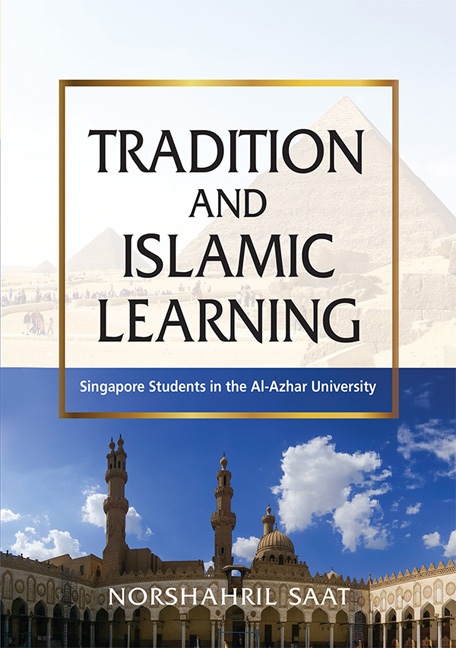Book contents
- Frontmatter
- Dedication
- Contents
- Preface
- Acknowledgements
- Abbreviations
- A Note on Translation, Spelling and Other Conventions
- Chapter 1 Introduction: Islamic Education and Religious Authority
- Chapter 2 The Al-Azhar University: A Historical Sketch
- Chapter 3 Prominent Southeast Asian Al-Azhar Graduates
- Chapter 4 Al-Azhar Today: The Experience of Singapore Students
- Chapter 5 Conclusion
- Bibliography
- Index
- About the Author
Chapter 3 - Prominent Southeast Asian Al-Azhar Graduates
Published online by Cambridge University Press: 04 July 2018
- Frontmatter
- Dedication
- Contents
- Preface
- Acknowledgements
- Abbreviations
- A Note on Translation, Spelling and Other Conventions
- Chapter 1 Introduction: Islamic Education and Religious Authority
- Chapter 2 The Al-Azhar University: A Historical Sketch
- Chapter 3 Prominent Southeast Asian Al-Azhar Graduates
- Chapter 4 Al-Azhar Today: The Experience of Singapore Students
- Chapter 5 Conclusion
- Bibliography
- Index
- About the Author
Summary
In the early twentieth century, Singapore was a hub for intellectual exchanges. Modernist ideas from Egypt, particularly transmitted from the likes of Muhammad Abduh and Rashid Rida, made their way to Southeast Asia via Singapore. One of the key modernist thinkers who was then living in Singapore was Syed Shaikh al-Hadi. Inspired by the modernist movement in Egypt, al-Hadi became active through the magazine al-Imam (the leader), which drew inspiration from the Egyptian al-Manar (the Beacon). Al-Imam promoted ideas critical of the traditional religious establishment. Pieces from al-Manar were also translated into al-Imam, and the slant and angle also followed the Egyptian journal. Al-Hadi travelled widely during his younger days. When he went to perform the haj, he took the opportunity to study under many ulama in Mecca and Egypt, and among those whom he studied under was Abduh. He was particularly interested in Abduh's reformist ideas and wanted to apply them to Singapore's context (Firdaus, Wan Hussein and Mohd Raman 2010, pp. 25–26).
Southeast Asian students studying at the Al-Azhar University also grew in numbers by the 1920s. They began to organize themselves based on common language, culture and homeland. In October 1925, Indonesian and Malay students in Cairo established the periodical Seruan Azhar (The Call of Al-Azhar) (Roff 1970). One of those who was active in running the journal was Ahmad’ Atta Allah Suhaimi. His brother, Muhammad Fadhlullah Suhaimi, was also a student at the Al-Azhar University between 1911 and 1916. Muhammad Fadhlullah struggled for women's equal access to education. In 1936, Muhammad Fadhlullah set up a madrasah for girls, called Madrasah Al-Maarif (Firdaus, Wan Hussein and Mohd Raman 2011, pp. 42–43). Al-Hadi and Muhammad Fadhlullah are examples showing how the Al-Azhar University impacted the Singapore religious discourse in a positive way in the early twentieth century.
By the early twentieth century, Singapore also became the centre for Islamic learning for the region. One school that attracted students pursuing religion is Madrasah Aljunied Al-Islamiah, which was established in 1927. The school attracted students from Brunei and Malaya. For example, Bruneian Mohamad Zain Serudin was a graduate of the school and later became the Mufti of Brunei. The school continues to function as the premier institute of religious learning in Singapore, although Malaysians and Bruneians no longer send their children there. Still, the madrasah prepares most of its students to study at the Al-Azhar University.
- Type
- Chapter
- Information
- Tradition and Islamic LearningSingapore Students in the Al-Azhar University, pp. 34 - 53Publisher: ISEAS–Yusof Ishak InstitutePrint publication year: 2018

